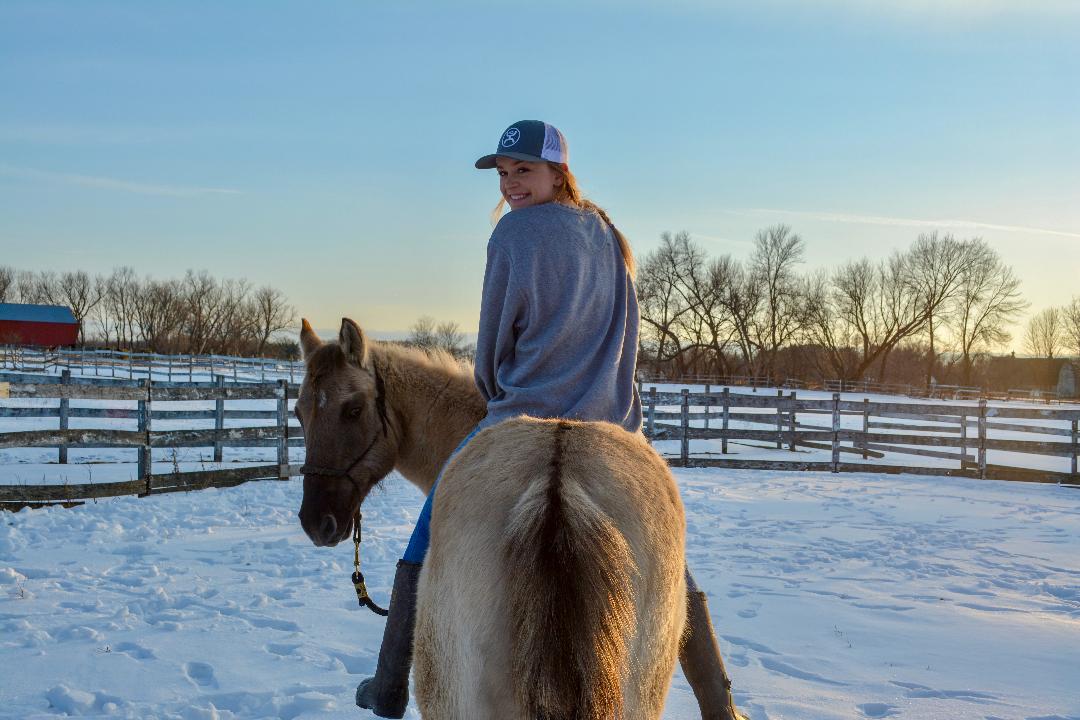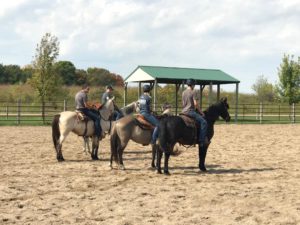

By Samantha Sansevere
Rescuing animals has always been a passion for me and my family. It always will be. Even when we’re stretched thin, busier than ever, have plenty of other animals to take care of… When there’s an animal in need, we step up to do whatever we can. I personally try to do my part by rehabilitating and retraining rescue horses, whether they are rescued from kill pens, neglectful situations, or just a bad circumstance in general.
Sometimes my efforts all work out beautifully. Like Posey — a terrified and flighty reject from the kill pen that I worked with who became a competitive children’s hunter jumper pony. Sometimes everything works out the way I wanted it to. Other times, the kill pen rescue I am trying to rehab breaks my collarbone. And then six months later another kill pen rescue comes along and breaks my other collarbone.
This is a video taken by my mom when I got bucked off of a kill pen rescue pony I was working with in the fall of 2016 and broke my right collarbone. This was one of the first times I’d ever been bucked off, and the first time I’d ever been seriously injured from riding. I work with a lot of troubled horses, but I have never been bucked off of a full size horse, which is why when this happened I was confident in my ability to keep my seat. Unfortunately though, when a pony bucks and you’re a full grown adult, it can be difficult to keep your balance. One moment that pony was under me, and the next she had tucked her head between her legs and was gone from under me. Full size horses are much easier to ride the buck out of!
Working with horses is such a remarkably humbling experience because you can feel so in tune with them and so connected with them one minute, and the next you’re lying on the ground broken.
It isn’t always easy. It doesn’t always work out. Working with horses is such a remarkably humbling experience because you can feel so in tune with them and so connected with them one minute, and the next you’re lying on the ground broken. I didn’t lose confidence in my riding ability or being around horses in general — I never blamed the horses for me getting hurt, I blamed myself. It was my fault and I knew it. So, I spent the next year trying to educate myself and read every training book I could come by. I went to every clinic I could. I traveled to Arizona to learn from some of the best trainers in the country. I studied, studied, studied just so that I could understand what went wrong. How I could’ve let something like that happen. How I could’ve been so out of tune with those horses, and how I could’ve misjudged those situations so much. How I could’ve rushed things when my philosophy has always been to do things on the horse’s time. I lost faith in my ability to help rescue horses. I lost faith in my horse sense.
I stopped posting about my horses on social media. I stopped taking clients. I stopped responding to messages other than for lesson students or camps — I believed in my ability to teach people, I just doubted my ability to help troubled horses anymore, and that was hard to admit to people so it was easier to just not respond. (As a side note, I am so sorry to anyone that ever reached out and didn’t get a response for the last year about horses for sale, training, or anything else. This was a difficult time for me.) I avoided risks. I took it too easy. I only rode horses I knew well and trusted. I tried to figure out what I should’ve done differently — to understand how I misunderstood and misread a situation so much that it resulted in broken bones after being tossed off ponies I was just trying to help, TWICE.

Time passed. I kept riding the horses I knew like the back of my hand, kept giving riding lessons — because fostering a passion for horses in children is such a huge passion for me, and is so therapeutic and rewarding. I started training horses that I knew, and even put a couple first rides on some horses — horses that didn’t doubt humans, horses that trusted me, and horses that were calm. Horses that weren’t rescues with an unknown history. Horses that weren’t risks.
Meanwhile, my rescues waited in the pasture until I was ready. They waited for me to be ready because there’s no way in hell I’d ever actually rehome them until I know they are equipped with skills that make them valuable enough to go to a home that would never let them end up in a bad situation ever again. I owe my rescued horses and ponies better than that. So they waited until I was ready to give them the training they deserve.

Slowly, I started working with them again. I started bonding with them again. I started trying to understand them again. And finally, when that naughty kill pen rescue that nobody wanted and has been waiting so patiently for a chance to show that he’s worth something gave me the best ride I could’ve asked for one day and showed complete trust in humans, I felt complete again.
These kill pen rescues, these rejects of the equine world, these backyard throwaways… They have so many stories to tell us, if only we’d listen; so much to teach us, if only we’d slow down and pay attention; so much to give to the world, if only we’d give them a chance.
There a lot of rescue horses on our farm right now that I could write about in this post, but this one is about Gru. Gru is just under 14hh, and according to our vet, he’s in his mid-teens. Gru was the last pony I rescued before I broke my collarbone for the first time. Gru was the pony that I thought would be my biggest challenge, but he has become the pony that has made the biggest impact on me.
Gru was rescued from the kill pen in the summer of 2016. I broke my right clavicle in the fall of 2016 working with a different rescue pony, and my left clavicle in the Spring of 2017 with another different rescue pony. And to be honest, it was really hard for me. The first collarbone break didn’t really damage my faith in my ability with horses, but after it happened a second time just six months later, I really started to doubt myself. How could this happen to me, twice? How could I have messed up so badly? I blamed myself and my training abilities completely for getting hurt. I never once blamed the horses that hurt me. It was my fault for not retraining them properly. So I spent the last year healing, reading, riding, teaching, and trying to get back to the groove that I felt after training ponies like Tater Tot and Misty. Now, these days, because of horses like Gru, my pony Louie, and my mustang Clark, I finally feel like I am back to myself again.

When he got to the farm, he was skinny, and crabby, and angry. He was a biter, and he turned his butt to people. He kept his head down low. He didn’t run away from us, but I think that is mostly because he just didn’t have the energy to. He was frustrated with the world. He wanted us to all think he was the toughest dude on the farm. I could see through it, though — we rescued him with a second horse, a tiny miniature leopard appaloosa that is almost completely blind (who has a permanent home with us because of his vision problems). For all the crabbiness Gru showed us when he arrived, he was so sweet and kind and protective over that little appaloosa. So, I named him Gru, after the character in Despicable Me who tried so hard to be a villain but deep down was actually so sweet and kind-hearted.


Gru is a really pretty and uncommon color — a silver grullo — which attracted a lot of attention to him when he went up for adoption in the kill pen at Simon’s Arena. Several folks inquired about him, but the staff at the kill pen said that three people backed out from adopting him after they heard he was a biter, a fence crasher, and just had a bad attitude in general. He has come such a long way, and he has taught me so much, and I am so proud of him. It turns out he just wanted to be seen and heard and wanted a job.
So I tried to give him one. I started bonding with him again, and taking it slow. Until one day, things just started to feel right again.

My mom was very concerned when I decided one day that my first ride on him would be at cow sorting practice at Out-West Arena (sorry ma, even two broken collarbones later I still take risks). For some reason, it just felt right that day. I suddenly felt like it was the right thing to do. I felt compelled to take him out and ride him. I had faith in him that day, and he amazed us all. He wasn’t spooky. He watched intently before his turn to go, and for the first time, I felt a change in him — and a change in myself. After that day, he was a different pony. Since then, we’ve used him as a camp and lesson horse and he loves attention and having a job. When he has a purpose, he is such a hard worker. It’s been a journey, and he didn’t always make it easy, but he has helped me feel confident working with rescues again.

In just a few months, Gru will be looking for a new home. It will break my heart to say goodbye to him, but it will also be such a wonderful moment for both of us, because I know that he will be going to a home that will love him the way he deserves and he will make room for me to rescue and rehab another pony like him, which I wasn’t sure that I would ever have the confidence to do again. Because of him, I know that I can move on and begin rescuing and rehabbing again, and for that, I am forever grateful to him.

He will become a little girl or little boys best friend, or maybe he will become the beloved family member for a small adult rider. Either way, I know that he will move on and find the home that he is meant to have, and that he will be treasured the way that he deserves, because he is finally a pony that has proved he is worth being treasured.
Thank you, Gru. You’ve helped me more than I could ever help you.
“There is no mysticism, no magic, or only one method in the realm of good horsemanship. It’s knowing that everything you think you know about horses may change with the very next horse.” – Tom Dorrance


